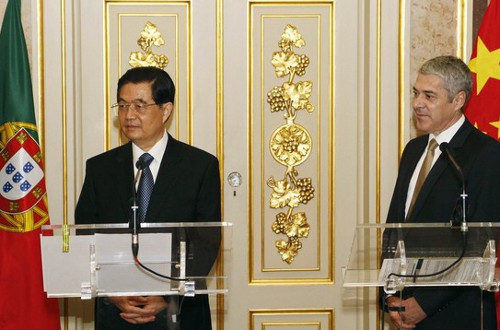
Chinese President Hu Jintao opted not to sit idly in Beijing and watch President Obama circle the Middle Kingdom in his ‘post-shellacking’ tour of Asia. Hu showed that two could enhance the influence of their countries far from home. While both leaders are strengthening long-term ties through their visits, the victor of the flurry of G-2 diplomacy may become apparent as soon as the November 11-12 G-20 summit in Seoul when the U.S. and China clash over the imbalances in the global economy.
Obama’s vist to Asia is about pushing American values, products, and power with the leaders of Asia’s most influential democracies: India, Indonesia, South Korea, and Japan. Arguably the most important tripof his presidency to date, a successful visit will enhance American influence in Asia at a time when many in the region are looking for U.S. leadership to counter an increasingly assertive Chinese posture in the region. Obama’s visit could also bolster the fragile American economy by boosting exports to the world’s fastest growing markets.
Not to be outdone, the Chinese president has just concluded back-to-back state visits to Paris and Lisbon, where he received treatment fit for a king. Following the visit of Chinese Premier Wen Jiabao to Greece and Brussels last month, Hu traveled to Europe to further cement Chinese economic clout and political influence in Western Europe, home to America’s closest allies and partners.
This trip is important not only for China, but for France as well. For President Sarkozy in particular, the stakes are huge. His approval rating sits at 26 percent following a bruising victory over the unions to pass important reforms to the pension system. Next Monday, he is expected to unveil a major reshuffling of the cabinet, including possibly replacing Prime Minister Francois Fillon with Jean-Louis Borloo. Sarkozy will be keen on consolidating these important domestic political achievements by scoring foreign policy victories. Hu’s visit is therefore of extreme importance as France prepares to assume the chairmanship of the G8 and G20 in 2011, just one year before the French presidential election.
Like most foreigners visiting Paris, Hu went on a shopping spree. Instead of visiting the high-end boutiques at the Place Vendome, he committed China to $20 billion of purchases in high technology, including major contracts with Areva and Airbus. France and China set a goal of doubling trade between their two countries from $40 billion to $80 billion over the next five years. Hu also gave China’s political support to France’s 2011 chairmanship of the G-20 and discussed with Sarkozy their shared vision to rebalance the global economy and improve global governance through multilateral institutions, all major foreign policy priorities for the Elysée Palace.
Meanwhile, over the weekend, Chinese Deputy Foreign Minister Cui Tinkai rejected out of hand a U.S. proposal for setting targets to reduce current account imbalances at the G-20, saying it harkened back to the “days of planned economies.” (Tea Partiers take heart: even Chinese Communist Party officials are calling Obama a socialist these days.) He suggested instead that the G-20 summit should focus its attention on what Beijing sees as the real problem: the Federal Reserve pumping money into the global economy and in effect devaluing the dollar relative to other currencies. While China’s Vice Finance Minister Wang Jun softened China’s stance by offering cautious support for QE2 later in the weekend, it is still certain that Beijing will drive a tough bargain at Seoul and vigorously resist any U.S. attempt to forge a coalition of states to criticize China’s currency manipulation. The stage is set for a Mexican standoff between the United States and China in South Korea.
President Hu can be confident that most emerging market economies at the G-20 will not criticize China’s currency manipulation in the absence of coordinated American and European criticism of China. The key, then, is for him to divide the United States from its European allies in Seoul. With Germany already fuming about quantitative easing, France’s neutrality at the summit is essential for China.
Sarkozy demurred when given the opportunity to criticize China’s currency manipulation during their joint press conference in Paris. Will he also remain silent at Seoul and during France’s chairmanship of the G-20 next year? Can China’s $20 billion of contracts signed in Paris buy France’s refusal to back President Obama’s attempts to align the international community against Chinese currency manipulation and address destructive structural imbalances in the global economy? It is too early to tell, but by the conclusion of next week’s G-20 summit in Seoul, it will be clear which of the two world leaders gained the greatest short-term benefit from their simultaneous world travels.
Jeff Lightfoot is an Associate Director of the Atlantic Council’s International Security Program. Photo Credit: Associated Press.
Image: HU500x.jpg
